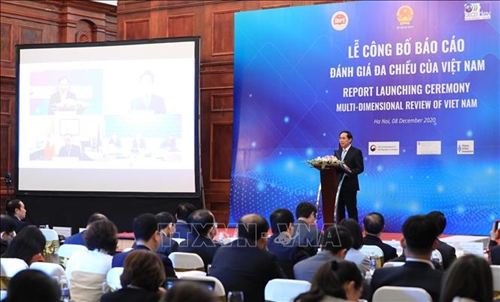In his remarks at the event, Deputy Foreign Minister Bui Thanh Son highlighted Vietnam’s major achievements since the launch of the “Doi Moi” (renewal) economic reforms nearly 35 years ago.
    |
 |
|
Deputy Foreign Minister Bui Thanh Son speaks at the ceremony |
To break through in the next stage of development, Vietnam needs a new approach and vision that are relevant to today’s world and at the same time, must take full advantage of its opportunities and competitive edges, he said, adding that these would help the country realise goals of becoming a developing, upper middle income country with a modern industry by 2030 and a developed, high-income economy by 2045 as set in the draft strategy for 2021 – 2030.
Son appreciated the report as a reference for the Vietnamese government, ministries and agencies to draft the national socio-economic development strategy for the next 10 years.
Minister of Planning and Investment Nguyen Chi Dung said the “Multi-dimensional Review of Vietnam: Towards an Integrated, Transparent and Sustainable Economy” is an initiative by the OECD which identifies the main constraints to Vietnam’s growth and proposes priority areas for action to connect economic competitive advantages with social and welfare goals. It also provides Vietnam with the OECD’s expertise in key areas to make policies adaptive to a changing world and to forecast future growth.
The report is composed of three parts: Initial Assessment, Strategic Recommendations, and From Analysis to Implementation.
The first part – “Initial Assessment” – builds on the Sustainable Development Goals’ (SDGs) structure of People, Prosperity, Partnerships, Planet and Peace. For each of these dimensions, strengths and constraints, as well as trends that could create opportunities or hamper future growth are identified.
The second part of the report provides strategic recommendations to help Vietnam’s transition towards an integrated, transparent and sustainable economy. In particular, the report suggests policies to create new opportunities in agriculture, manufacturing and services; enhance the efficiency of State-owned enterprises; strengthen Vietnam’s tertiary education in order to upgrade skills and create innovation; improve the management of natural and energy resources to secure sustainable growth and encourage a proactive transition to a low carbon economy.
The third and last part – "From analysis to implementation" – recommends Vietnam to strengthen its capabilities for implementation and proposes a scoreboard to monitor the progress of reforms.
Source: VNA